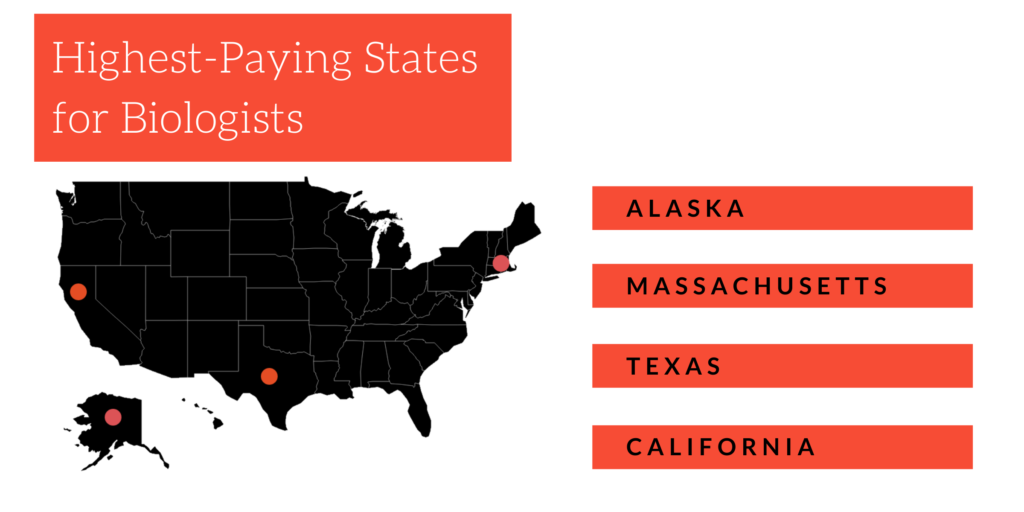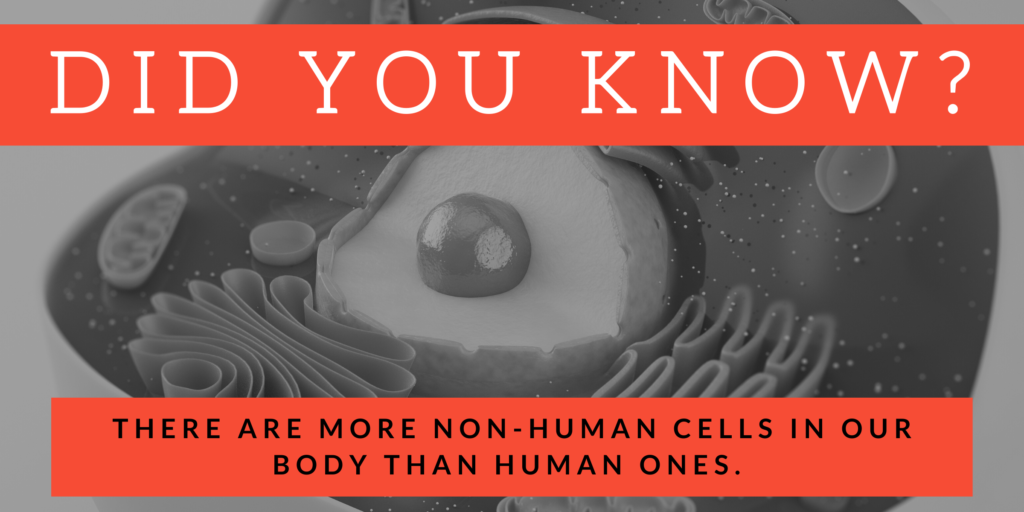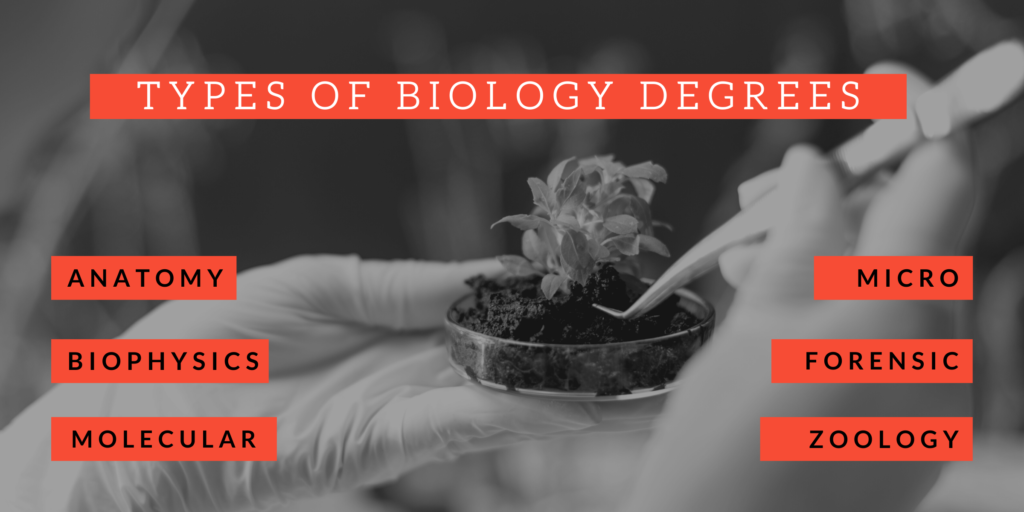It seems to me that the natural world is the greatest source of excitement; the greatest source of visual beauty; the greatest source of intellectual interest. It is the greatest source of so much in life that makes life worth living. – David Attenborough
If you’re looking for a career that gives meaning to your life, you can hardly do better than a job built around the science of life itself. Biology is the study of living organisms and life processes. People who work in the field of biology have a deep understanding of the world that few other career fields can match. High-paying biology jobs allow practitioners and researchers to apply this understanding of life sciences to a range of industries, services and scientific inquiries.
The highest paying jobs in biology include roles in the health care field, agriculture, environmental science and scientific research and development. What the best-paying biology jobs have in common is that they draw upon the strong foundation of knowledge of living organisms that biology majors develop during the course of their education. 
Scientists are rapidly making progress on such mind-bending projects as growing actual meat without animals or using algae to break down oil spills.
Working with this knowledge is not just intellectually interesting; biology knowledge is powerful as well. The contributions professionals make in biology careers actually preserve and improve life, health, and the natural world. While many careers simply keep the gears of the economy turning, biology careers actually drive human progress. For those who want a career that’s personally rewarding, intellectually stimulating, and lucrative, a career in biology deserves serious consideration.
Skip To:
- What are the Highest Paying Jobs in Biology?
- What Degrees Lead To Lucrative Biology Careers?
- How Can We Help You Find a Biology Degree?
Many biology jobs involve laboratory and fieldwork, gathering samples, making observations running experiments, and analyzing outcomes. Other people with biology backgrounds work for companies or governments to connect, market, educate, and counsel about biological products and services, from pharmaceuticals to environmental issues. In short, career options with a biology degree are vast and varied.
STEM (science, technology, engineering, and math) careers are widely seen as the academic and economic future. Whether you want to work in pure science research or apply discoveries in biology to solving real-world problems, there are jobs in both the public and private sector. Of course, medicine is a popular and obvious path for those with a biology degree, but there are many other options as well. And because scientific knowledge is constantly growing, new fields and specializations are always emerging, such as Bioinformatics and Cytogenetics.

With such a wide range of careers in biology, it’s no surprise that you’ll need different degrees and training for each. Biology is not a field you can enter without a college degree, and most jobs in biology require graduate or postgraduate study as well. You may be wondering what type of biology job you can get with your biology degree. Conversely, you may be interested in a particular biology career and wonder what educational path you ought to take to get there.
No matter what your goals, you’ll want to know the salary expectations. STEM careers, including biology, tend to be lucrative jobs, and gaining a high-paying biology career is a priority for most graduates. You should also be aware of which fields are most in-demand, since this will increase your likelihood of landing a position with a desirable employer in the location of your choosing.
In this guide, we’ll look at different lucrative careers in biology, how people initiate these careers, degrees in the field (including different specializations), and explore applicable content we’ve already created. Before we dive in, let’s consider your history, traits, and personal career goals:
Keep these questions and considerations in mind as you explore this resource:
Keep these questions and considerations in mind as you explore this resource:
- What interests you about biology? Is it the hands-on work, or the development of broad theories? Are you interested in natural phenomena or more interested in the way the natural world impacts humans (and vice versa)?
- Are you a technically-minded person who thrives on laboratory work and analysis? Or are you interested in using biology knowledge and skills to treat problems, such as crop diseases and medical problems? Are you drawn to the teaching and communication side of biology?
- Are you motivated and inspired by having a positive impact on the world around you? Would you rather commit yourself to a biology career that solves issues like health or sustainability than pursue the highest salary possible? Or are you more motivated by challenging, prestigious, and lucrative work in the private sector?
- What biology training and education have you already achieved? Perhaps you took college-level biology coursework in high school. Or you may have taken classes that are part of a biology degree, such as anatomy or statistics, as part of a degree in a different field. How much further schooling do you want to commit to in pursuit of your biology career?
- Are you looking to change careers in order to enter the field of biology? If so, do you have skills and education that could transfer to a biology job? If not, can you commit to starting from scratch in a field with a relatively high education threshold?

OK, let’s move on to some of the most lucrative biology degrees and careers:
What are the Highest Paying Jobs in Biology?

Careers in the Medical and Science Industry
It’s no coincidence that many of the highest-paying jobs with a biology degree are part of the medical health professionals occupations. After all, having a knowledge of biological systems is critical to the interventions – like diagnostic tests, procedures and prescription drugs – used to assess and improve human health.
In many careers in the medical and health care industry, biology graduates in some way contribute to efforts to prevent, diagnose or treat injuries, illnesses and other medical conditions.
Technical skills in the use of medical equipment and interventions are critical for healthcare careers. Skills in health communications and patient health education are also important. All health care personnel who work with patients in clinical settings should learn appropriate ways to communicate information so that patients can understand their medical conditions and treatment options and make an informed decision about their care.
Doctors
Naturally, many people who earn a bachelor’s degree in biology go on to become doctors or surgeons. A bachelor’s degree in biology is the most popular undergraduate path to prepare for medical school. Physician is, by far, one of the highest-paying biology careers.
The United States Bureau of Labor Statistics (BLS) reported that doctors and physicians enjoy an annual salary that’s “among the highest of all occupations,” in excess of $208,000 per year as of 2021. Average salary for a physician varies by specialty. As of 2021, the BLS listed cardiologist as the type of physician with the highest national average salary, $353,970 per year. The national average salary for anesthesiologists amounted to $331,190 per year. Emergency medicine physicians reported a national average salary of $310,640 per year.
The training and job duties for each of the many types of physicians are long but quite straightforward. All doctors need to have the same medical knowledge for their area of specialty. This means pursuing a medical doctoral degree, like a Doctor of Medicine (MD) or Doctor of Osteopathic Medicine (DO). It also means completing residency training and, for some specialties, fellowship training after completing your medical degree.
There are numerous types of physicians. Surgeons, for example, perform surgery in medical facilities like hospital operating rooms and outpatient surgical centers. Cardiologists are heart doctors. Anesthesiologists administer medications to relieve a patient’s pain and sedate them for medical procedures. Dermatologists are skin doctors. A doctor of podiatric medicine is concerned with the health of the feet and lower legs. Oncologists treat cancer patients.
Physician Assistants
Doctors aren’t the only medical staff patients encounter in clinical settings. Many aspiring physician assistants are also biology graduates. A physician assistant works directly with patients in clinical practice, diagnosing and treating medical conditions. Physician assistants practice medicine, but they must do so under the supervision of a licensed physician.
The median salary for the physician assistant occupation in 2021 was $121,530 per year, according to the BLS. This annual salary lands physician assistant a spot among the high paying jobs with biology degree, even if it does require further education.
After earning their bachelor’s degree in biology, an aspiring physician assistant would need to attend a master’s level PA program and meet the requirements to attain a state license.
Nurses
The health care system as we know it would fall apart without the contributions of nurses. A registered nurse (RN) provides hands-on, direct patient care and carries out care plans as ordered by a physician. These care plans may include administering medication and other treatments.
Registered nurses aren’t required to attain an advanced degree. Instead, they can prepare for this role with only an Associate Degree in Nursing (ADN) or a Bachelor of Science in Nursing (BSN). As such, most aspiring registered nurses won’t major in biology, but science classes in biology are sure to be part of the nursing degree curriculum.
For registered nurses, the BLS reported a median salary of $77,600 per year as of 2021.
Dentists
If you’re interested in applying your knowledge of living organisms and biological systems to the field of dental and oral health, you could use a bachelor’s degree in biology as a launchpad for a career as a dentist. Dentists are medical professionals who diagnose and treat dental issues and other diseases and conditions that pertain to the health of the teeth, gums and mouth.
Dentists don’t just clean teeth and fill cavities. Their work to enhance the health of your teeth and mouth affects your body as a whole. For example, dentists screen patients for signs of oral cancer when they examine a patient’s mouth during a routine checkup.
Like physicians, dentists need a doctoral degree. The degree awarded upon completion of dental school is a Doctor of Dental Surgery (DDS) or Doctor of Dental Medicine (DDM) degree. The BLS reported a median salary of $163,220 per year for dentists as of 2021. This salary makes dentist one of the top high-paying jobs with a biology degree.
Pharmacists
The study of the life sciences also informs the development of new drugs used to prevent and treat medical conditions. It’s no surprise, then, that having some knowledge of the field of biology is valuable if you want to become a pharmacist. The median annual salary of $128,570 reported by the BLS in 2021 makes pharmacist another of the many high-paying jobs for biology majors.
Pharmacists are professionals in the healthcare field who dispense prescription medication to patients as ordered by a doctor, physician assistant or advanced practice registered nurse. A pharmacist’s job duties include filling prescription orders and educating patients about the use of their medications. They may also provide advice to patients on what over-the-counter products they may take for a common medical issue and warn patients of potential interactions among and between various over-the-counter and prescription medications.
To become a pharmacist, you will need more than a bachelor’s degree in the field of biology. You will need to attend an accredited pharmacy program to earn a Doctor of Pharmacy (PharmD), which is the standard pharmacy degree required for this occupation.
Healthcare Occupation FAQs
If you’re interested in pursuing a biology degree as an entry point into a clinical medical career, you should explore the following degree and career guides:
- What Can I Do With a Degree in Medicine?
- Highest Paying Medicine Degrees
- What Degree Should I Get for Medical School?
- What Degree Do You Need to Be a Microbiologist?
- What Degree Do I Need to Be a Genetic Engineer?
- Which Degree Do You Need to Become a Doctor?
- How to Become a Veterinarian: What Major Do You Need to Be a Vet?
- Top 10 Highest Paying Medical Specialties
But there are many, many other high-paying biology degrees, and the training for non-medical jobs may be less straightforward. To understand the career paths open with a biology degree, and the highest-paying careers in the field, we’ll need to zero in. In this guide, we’ll look outside the field of medical doctors to cover different in-demand and lucrative biology careers.
Although science jobs are highly technical, you’ll need to have soft skills to succeed in biology jobs, as well. Virtually all workers in the field of biology need to be able to collaborate and work as part of a team, communicate with stakeholders, and share their findings with non-scientists. To get the most lucrative biology jobs, you’ll usually need to be able to manage others, which requires a whole set of leadership and management soft skills.
In considering some of the most common high-paying biology degrees and careers, we’ll be looking at not only the hard skills you’ll learn but the soft skills you’ll need to develop for success in each.
Veterinarian

A high-paying job that involves saving lives and being around animals all day? Sign us up!
Becoming a veterinarian isn’t easy. The work they do managing animal health care can be challenging. However, these professionals have an enviable career that’s immensely rewarding and lucrative.
Veterinarians are animal doctors; they prevent and diagnose illnesses and injuries in animals. Some veterinarians work with pets like dogs and cats. Others focus on exotic pets like parrots and tortoises. There are also veterinarians that work with horses, lab animals, livestock, zoo animals, and even wildlife. Their work is interesting and challenging because of the different kinds of animals and health needs they deal with every day.
Because of the varied and challenging nature of the work, becoming a veterinarian requires a lot of education. To become a veterinarian, you’ll need to earn a bachelor’s degree in biology, then earn a Doctor of Veterinary Medicine degree from an accredited veterinary school, and earn a license in the state where you work.
As a veterinarian, you can expect to earn a median salary of $100,370 per year as of 2021, according to the BLS. The highest-paid 10% of veterinarians take home an impressive $$165,600 per year. And job growth for this particular biology degree is very robust, too. The demand for veterinarians is expected to increase by 19% from 2021 to 2031. That’s nearly four times the national average job growth rate expected across all occupations.
Hard Skills
- Animal anatomy and physiology
- Surgical Operations
- Diagnosis
Soft Skills
- Empathy for their animal patients and pet owners
- Communication
- Flexibility
Biochemist
The intersection of living organisms and manmade materials is where you’ll find some of the fastest-growing and highest-paying biology fields today, such as biotechnology and biomedicine. Biochemistry is another field that integrates another branch of life science- in this case, chemistry.

Biochemists study the biological life processes and structures of cells and organisms. Biochemistry is divided into three specialties: structural biology, enzymology and metabolism. Biochemistry is a high-paying biology degree.
You’ll need to earn at least a master’s to work as a professional biochemist, and usually a PhD to work in independent research, which is a major investment. With these credentials you can earn an excellent salary.
According to the Bureau of Labor Statistics, biochemists and biophysicists earn a median salary of $102,270 per year as of 2021. The highest-paid 10% of biochemists can expect to make $167,210 or more per year as of 2021. This six-figure annual salary cements biochemist’s spot among the highest paying jobs with biology degree.
The field is also growing steadily, at a rate of 15%, which is much faster than the national average job growth rate predicted for all occupations between 2021 and 2031.
Hard Skills
- Chemistry
- Physics
- Laboratory Research
- Analysis
Soft Skills
- Communication
- Collaboration
- Project Planning
- Application of findings
Biomedical Engineer
Biomedical engineers enjoy the best of both professional worlds: improving human well-being and earning one of the highest salaries in biology. They also get the respect of a prestigious profession and a steady rate of job growth.
The BLS reported that biomedical engineers earn an average salary of $97,410 per year as of 2021. This annual salary rate makes biomedical engineer a very lucrative biology job – one of the top high-paying jobs in biology, in fact. Those in the top 10% of their field earned an impressive annual salary of more than $154,750 per year in 2021. The projected job growth for biomedical engineers for the period from 2021 through 2031 was 10% – twice as high as the average job growth rate predicted across all professions.
Biomedical engineers, as the name implies, blend medical science and engineering principles in order to design medical devices, equipment, and software. In addition to an interest in biology, you’ll need a strong aptitude for engineering in order to pursue a degree in this field. A bachelor’s degree in general biology is not enough to get an entry-level job, such as research assistant, in this particular field. Instead, you’ll need to start with a bachelor’s degree in biomedical engineering or bioengineering. A master’s degree in these disciplines or a related field can help you get one of the field’s more high-paying jobs.
Hard Skills
- Electrical Engineering
- Mechanical Engineering
- Medicine/Anatomy
- Materials science
Soft Skills
- Problem Solving
- Teamwork
- Innovation
Genetic Counselor
Our understanding of genetics has skyrocketed in the past decade, and we’re making new discoveries every day that have real-world applications for people’s health and well-being. While geneticists perform research studies related to the genes, genetic disorders, and gene expression, genetic counselors are responsible for actually using this information to help people.
Genetic counselors assess individuals and families to determine their risk for developing or passing on inherited conditions, such as genetic disorders like Cystic Fibrosis. They interview patients, run diagnostic tests, and discuss their findings with patients and their families, usually in a clinical medical setting like a hospital.
Genetic counseling requires a master’s degree in genetic counseling or in genetics. You’ll also need to become certified through the American Board of Genetic Counseling, which involves passing a rigorous exam. Although the career path is long, this is a lucrative biology degree. The Bureau of Labor Statistics reported that genetic counselors earned $80,150 per year as of 2021.
The Bureau of Labor Statistics also projects that demand for genetic counselors will grow by 18 percent between 2021 and 2031. That’s more than three times the national average job growth rate predicted for all occupations and one and a half times as fast as all other healthcare practitioners.
Hard Skills:
- Public Health
- Epidemiology
- Clinical Diagnosis
Soft Skills:
- Empathy
- Communication
- Interpersonal Skills
Microbiologist
Another of the high-paying biology careers you might consider if you have an interest in life sciences is microbiologist. According to the Bureau of Labor Statistics, microbiologists earned a median salary of $79,260 per year as of 2021.
The job outlook for the 2021-2031 period is favorable. The BLS predicted a 9% rate of job growth during this period, which is almost twice as fast as the anticipated rate of job growth for all professions across the board.
Microbiologists are research scientists focused on the microscopic living world. They study microorganisms including viruses, bacteria, algae, fungi and even certain parasites. Microbiologists learn more about how these organisms survive, replicate and interact with their immediate environments.
Within the field of microbiology are subspecialties such as the following:
- Clinical microbiologist
- Environmental microbiologist
- Industrial microbiologist
- Public health microbiologist
- Virologist
To land entry-level jobs in this lucrative biology field, you’ll need at least a bachelor’s degree in biology or microbiology. If you have only a bachelor’s degree, your options for advancement will be limited. Having a PhD in microbiology will open more professional doors, allowing you to teach and conduct independent research.
Microbiology is a personally rewarding, as well as high-paying, biology career. Microbiologists make discoveries that have tangible impacts on human life, such as a deeper understanding of how malaria spreads or new methods to prevent the contamination of crops by fungus.
Hard Skills
- Research Planning
- Data Gathering
- Analysis
- Technical Writing
Soft Skills
- Problem Solving
- Innovation
- Organization
Agricultural and Food Scientist
What is more basic to life than the need for food? Everything we eat is the product of a long process of breeding, development, cultivation, and processing. Biological knowledge plays a huge role in maximizing the safety, efficiency, nutritional value, and sustainability of the food supply. Agricultural and food scientists research ways to protect and improve every one of these steps, from agriculture to ready-to-eat food products.
Within the field of Agriculture and food science are several specialties:
- Soil and plant scientists
- Food scientists and technologists
- Animal scientists
Most agriculture and food scientists work as soil and plant scientists.

To start work as an agricultural and food scientist, you’ll need a biology degree at the undergraduate level, and possibly a graduate degree for higher-paying jobs in the field. Those working in animal science may need a Doctor of Veterinary Medicine (DVM) degree.
Research and innovation in the field is rapidly growing. There are many emerging food production niches, such as plant-based substitute meats. And environmental challenges such as livestock antibiotic resistance, food safety concerns, and climate change mean that there will be an increasing need for new approaches to growing, processing, and packaging food.
All this means that the demand for this type of biology degree is growing quickly. The Bureau of Labor Statistics projected that jobs for agricultural and food scientists will grow by 8% between 2021 and 2031, which is faster than the average for all occupations. This is also a high-paying biology degree; agriculture and food scientists earned an average salary of $74,160 per year as of 2021. Those in the top 10% of the field earned more than $128,160.
Hard Skills
- Data Gathering
- Research
- Analysis
Soft Skills
- Problem Solving
- Innovation
- Collaboration
What Degrees Lead to Lucrative Biology Careers?

Now that you’re sold on pursuing one of the highest-paying jobs for biology majors, the question is – how do you land one of these lucrative roles?
A college education is a must for the highest-paying biology jobs, but first things first. Even before you begin applying to colleges to pursue an associate’s or bachelor’s degree, you should get your first experience with the field of biology in high school. If you’re interested in the life sciences, make an effort to take the most advanced biology science class available to you so that you will be prepared to be a biology major in college.
To qualify for the top-paying biology jobs, you should at the minimum complete a bachelor’s degree. An associate’s degree in biology will offer you only limited career prospects and, for most aspiring biologists, should only be pursued as a stepping stone to a bachelor’s degree.
An undergraduate degree in biology can lead to a number of money-masking jobs. How lucrative your position will be depends on several factors. Your level of degree matters. So does the type of agency you work for. Perhaps most important of all in determining your earning potential is the area of biology you choose to pursue.
Research-Focused Biology Degrees
Engineering, medicine, and technology are all well-established as high-paying industries. It’s probably no surprise that the type of biology jobs and biology degrees that exist at the intersection of fields like engineering, medicine, and tech, are so reliably lucrative that they are consistently among the highest-paid biology jobs.
All of these sectors have experienced a lot of rapid innovation in the past decade, and the pace of growth and discovery is not slowing. All of these interdisciplinary sciences are great fields if you’re interested in research. Many people with bioengineering, biomedicine, or biotechnology degrees work as researchers for private companies or government institutions, or university research centers. Depending on the area of your research, you may do work that is lab-based, field-based, or both, and will need strong analytical skills.
It probably goes without saying that an undergraduate biology degree is not enough to pursue professional work in any of these fields. You can probably find employment in these fields as a research assistant or technician with just an undergrad biology degree, but these entry-level roles are not high-paying. The BLS reports that their average salary is about $45,000 per year.
Most people working in these entry-level biology jobs aim to go on to a higher-paying professional role in the field, which requires earning a master’s in bioengineering, biomedicine, molecular biology, or biotechnology. To become a tenure-track professor, or conduct independent research, a PhD may even be necessary.
Clinically-Focused Biology Degrees

Some biologists are not researchers, but practitioners. Veterinarians, genetic counselors, and forensic scientists fall into this category. These interesting and lucrative biology careers are not focused on generating knowledge through research but rather on applying that knowledge to solving problems, usually for individuals.
Clinical skills are a major part of this type of biology profession. These skills include performing exams and drawing conclusions based on a set of established criteria. For that reason, most clinical biology jobs require not only a biology degree but also certification or licensure within that field.
Other Fields for Biology Degrees
Some of the highest-paying jobs with a biology degree aren’t biology jobs at all. With a biology undergraduate degree, you can go on to earn an advanced degree and work in a related field where having a science background and strong analytical skills is highly valued. Such roles include Environmental Lawyer (earning $122,960 per year), Health Communications Specialist (earning $63,335 per year), Health Services Manager (earning $100,980 per year), or Pharmaceutical Sales Rep (earning $81,020 per year).
Here’s a resource list from DegreeQuery to help set you up for success in a biology career.
How Can We Help You Find a Biology Degree?

Here at Degree Query, we’ve created a variety of content to help you determine a career path. We’ve answered common questions, provided in-depth guides about careers, ranked degrees on many metrics, ranked occupations, and much more. Here’s some of the work we’ve done that applies to working and studying in biology and adjacent fields:
Biology Degree-Related Rankings
- Top 10 Highest Paying Science Careers
- Top 50 Degrees for Changing the World
- The Fastest Online PhD Programs
- The 20 Highest Paying Online Degrees
- 10 Highest Paying Medical Specialties
- Highest Paying Science Careers
- Highest Paying Master’s Degrees
- 100 Most Affordable Online Colleges and Degrees
- 15 Degree Paths for Out-of-This-World Careers in Space Exploration
- The Top 10 “Green” Careers for Nature-Lovers
- Top 20 In-Demand Healthcare Careers
- The Best-Paying Jobs in Health Care: Top 15 Highest-Paying Medical Specialties
Biology Degree-Related Guides
- What Jobs Can I Get with a Biology Degree?
- What Can I Do With a Food Science Degree?
- What Can I Do With a Biomedical Engineering Degree?
- What Degree Do You Need to Be a Biomedical Engineer?
- What Can I Do With a Cognitive Science Degree?
- What Degree Do I Need to Be a Cognitive Neuroscientist?
- What Can I Do With a Data Science Degree?
- What Can I Do With a Degree in Planetary and Earth Sciences?
- What Can I Do With a Forensic Science Degree?
- What Can I Do With a Geology Degree?
- What Can I Do With a Mechanical Engineering Degree?
- What Can I Do With a Medical Technology Degree?
- What Can I Do With a Neuroscience Degree?
- What Can I Do With a Physics Degree?
- What Can I Do With a Chemistry Degree?
- What Can I Do With a Veterinary Medicine Degree?
- What Can I Do with an Anatomy and Physiology Degree?
Common Questions On Biology Degrees?
- What degree do I need to be a Marine Biologist?
- What degree do I need to be a Microbiologist?
- What degree do I need to be an Astrobiologist?
- What Major Do You Need to Be a Veterinarian?
- What degree do I need to be an Evolutionary Psychologist?
- What Jobs Can I Get with a Biology Degree?
- What Degree Should I Get for Medical School?
- Will I be accepted into a Master’s biology program if my undergrad degree isn’t in biology?
- Is a Bachelor’s Degree in Bioengineering a Good Direction to Go If I Want to Go to Medical School?
- What is a Bachelor’s Degree in Bioinformatics?
This is just part of the work we’ve created that discusses biology and related fields. We invite you to explore our homepage and search functions to further explore relevant content.
Related Resources:
